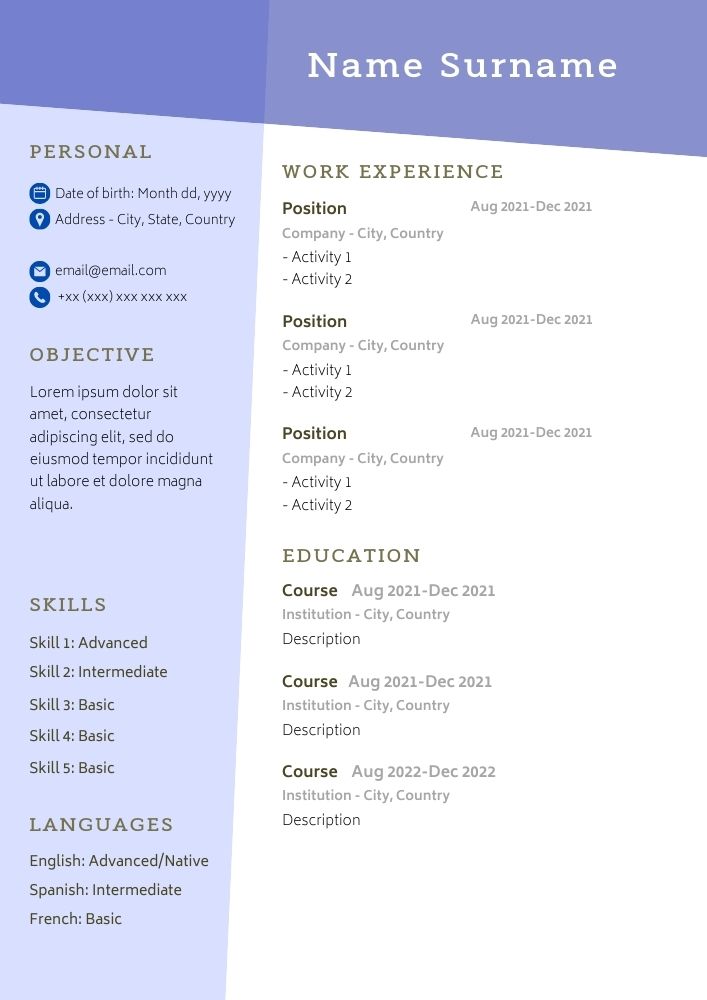Introduction
There are several benefits in working remotely, including no commute, more freedom, less distractions, and higher productivity. Furthermore, the working from home (WFH) job opportunities are highly competitive. Given that, you need to build a resume that stands out and gets you recognized in the crowd.
To begin with, let’s emphasize how significant a strong resume is. Since it typically represents your initial interaction with a recruiter, it is wise to keep in mind that “the first impression is the last impression”. If you know how and when to highlight your strengths, a strong resume can open up many doors for job opportunities and work interviews.
But, before even getting started building the perfect resume, or at least one which will increase your chances to get that remote and flexible job of your dreams.
So, what is actually a resume? Summarizing, Your professional experience, skill set, and qualifications are outlined in your resume, a document you submit with a job application. A resume is a thorough summary of both your professional and academic history in specific situations. It is one of the most important factors that will help increase the chances of you getting hired significantly.
How does a CV differ from a resume?

Nowadays, there is seldom any formal distinction between a CV and a resume in the hiring market. In Europe, they are the same exact thing and can be used interchangeably. If you are American, though, things are a little different. A resume is a one-page description of your professional background and relevant experience for the position you’re looking for. In contrast, a CV is a longer academic journal that details all of your experience, publications, and other information.
Key points on creating the best resume!

• Make it appealing at first glance!
Start by giving a rundown of your qualifications and major achievements. This will draw the employer and catch their eye right away. Making the correct impression is crucial since this section of your resume explains who you are to the hiring manager.
• Mind your language!
You should always consider the fact that the recruiter does not have information about you, so your choice of language will also reflect the way the message will get across. You have to find a balance between how formal or not, your writing style would be and also take care of the vocabulary you use.
• Be pertinent!
Answer the job description directly and detail why you are the best person for the position. You can accomplish this by connecting your successes to the components of the job function. The more you can show that you understand the position you’re seeking for, the more employers will take notice of your resume.
• Be precise!
Employers will evaluate you based on errors in grammar, punctuation, or structure. Use auto-correct, but also ask others to look over your work for mistakes.
• Do not add a photo (unless it’s demanded)!
They could be detrimental because they encourage people to judge you based more on your appearance than your actual work. In the subject of creativeness on resumes, there is some disagreement. If you want to be safe, the best method to land a job is still with a typical resume that highlights your significant accomplishments that are pertinent to the position, unless it’s in a really creative industry.
• Display knowledge on the business!
Your capacity to keep up with remote working trends will be demonstrated to the employer by your knowledge of the field in which you are applying. Recruiters will find you much more appealing if you can show that you have industry knowledge, so keep up with any news and changes in the sector.
• Words matter!
It is crucial to keep in mind that for online work, the applicant should place a strong emphasis on the key qualifications needed for the position. Make sure you read the job description and understand what the employer is looking for because many organizations utilize database software to weed out candidates who don’t use specific key words.
Small tips that can make the difference!
1. Choose the right font and keep equal margins on both sides.
2. It is important to send the document in .pdf format.
3. Save one version in .docx. This way you may be able to edit it later on, if it is necessary.
4. Read and reread the resume after it is done, looking for mistakes.
5. When you are writing about your strengths, make sure that you are not exaggerating. If you lie, it will be easily discovered in an interview.
6. Reinforce any languages you can speak.
7. Before starting writing your resume you must search the organization’s mission, purpose, values and achievements.

Which is the proper resume format?

A poorly structured resume will cause you to be overlooked during the initial contact. Here’s a guide to proper resume formatting. Make an outline for your resume first, using the following sections:
1. Resume Header with Contact Information
Firstly, you should start with personal information, keeping in mind the recruiter needs to know who you are, how old you are, where you live and your contact information, such as email address, phone number and LinkedIn profile. Then the recruiter can easily get in touch to let you know the following stages of the selection process. You SHOULD NOT provide unnecessary information in this area, in spite of that, you must be clear and objective as much as possible in all categories.
2. Personal Profile: Resume Objective or Resume Summary
Here you will define your professional goal and you should focus on the target job vacancy. Avoid writing things like, “I want to gain financial independence”, “I want to work in an environment that offers opportunities to grow”, things like these do not give the recruiter a good image of the candidate. Instead of that, use phrases like “I want to work in this company to contribute with the best I can” or “I want to work in this company to help the organization to achieve its goal, through proactiveness, productivity and eagerness to exchange knowledge”.
3. Remote Work Experience
Here you should refer to your professional experiences, online volunteering work and internship programs you might have been through. Remember that they should match the job vacancy you are applying for.
4. Education
It must contain your academic degree and pertinent achievements, relevant education information, certifications or any proof of relative knowledge you may have received in the past years.
5. Hard and Soft Skills
The first ones are skills that employees need to perform during their job duties effectively (computer skills, technology literacy, languages, technical knowledge). The second ones, on the other hand, are the personal qualities that help employees really thrive in the workplace. Here are some core soft skills that are of high value when applying for a remote work:
- Organization
- Time management
- Commitment
- Emotional intelligence
- Resilience
- Creativity
- Flexibility
- Analytical
- Research Skills
- Problem-Solving
- Multitask
- Reliable
- Strong work ethic
- Digital communication
- Organization
- Time management
- Commitment
- Emotional intelligence
- Resilience
- Creativity
- Flexibility
- Analytical
- Research Skills
- Problem-Solving
- Multitask
- Reliable
- Strong work ethic
- Digital communication
No experience? No problem! Here is what you should do:
Do not be concerned if you have little or no experience. There is a clever method to get you the job :
To convince your company that you are committed to the position and have given the application some thought, write an objective statement. What you can also do is find a skill or qualification like that in your repertoire. This can involve doing anything from taking on part-time work to participating in an internship or volunteering. Or even from your academic years, such as leading a group for students, tutoring, or applicable interests and hobbies you developed. Last but not least , it is of high value to mark resume keywords in the job description. The keywords are words and phrases that repeat and describe a particular quality or qualification. If you manage to do that , then it is half way done to persuade your employer that you have what is needed for this job!
No experience needed: Apply Now!
Resume Samples
The samples above are some of the many options available when you are trying to create a resume. It may seem easy but making an appealing, written in correct format, precise and also consistent resume could be a hard task for some people to achieve. This is why you shouldn’t miss our next section.
Bonus: The 3 best resume builders tools!
YES! It is highly recommended to use a resume builder. Most people use Microsoft Word to create their resumes. This can be a problem as the templates it provides are often dull and inert. You don’t want that . Your resume should stick out from the crowd rather than sound exactly like the others. You should also take in account that most resume builders guide you through all the process, showing you the right order of making a resume and helping you focus on one thing at a time.
Here is a list with the 3 best free resume builders we found online:
Given the importance of it, you should invest some time making a correct resume. A remote job or an internship , having a well-written and appealing resume is halfway to success. After reading this article we are confident that you have all the information and resources needed to make it happen . After doing so , don’t miss the chance to apply through our website. A remote and flexible opportunity is waiting for you and we are sure we can connect you with one that matches your profile!

Vaggelis Moutsios
Vaggelis Moutsios is a newly inspired author and a book lover since a young age. Born in Agrinio, Greece, graduate in Physical Education and Sport Science at Democritus University of Thrace, he decided to make a turn to his professional career. Remote work and the freedom it provides earned him. Following his passion for writing combined with his 6 years experience in the WFH market, he dedicated himself into introducing this world to more and more people.







